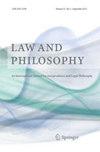战争分歧
IF 0.8
2区 哲学
Q3 ETHICS
引用次数: 0
摘要
本文章由计算机程序翻译,如有差异,请以英文原文为准。
Disagreement by War
求助全文
通过发布文献求助,成功后即可免费获取论文全文。
去求助
来源期刊

Law and Philosophy
Multiple-
CiteScore
1.40
自引率
0.00%
发文量
35
期刊介绍:
Law and Philosophy is a forum for the publication of work in law and philosophy which is of common interest to members of the two disciplines of jurisprudence and legal philosophy. It is open to all approaches in both fields and to work in any of the major legal traditions - common law, civil law, or the socialist tradition. The editors of Law and Philosophy encourage papers which exhibit philosophical reflection on the law informed by a knowledge of the law, and legal analysis informed by philosophical methods and principles.
 求助内容:
求助内容: 应助结果提醒方式:
应助结果提醒方式:


